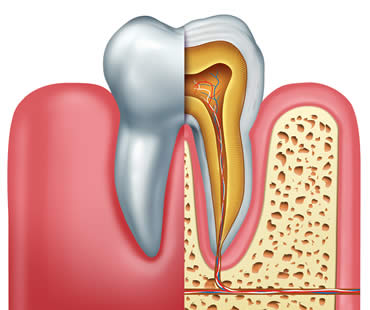
A toothache can make everything seem terrible. Your mouth hurts, your head aches, you can’t eat what you want, you can’t sleep comfortably – in general, you feel awful! Your tooth pain may be a result of decay that has caused an infection in your tooth pulp, calling for root canal therapy.
What does that mean exactly? When the inside of your tooth or the pulp becomes infected, it causes the tooth to deteriorate and cause pain and sensitivity. Action is needed to eliminate the infection and protect the tooth from worse damage. Root canal treatment is the best solution because the damaged pulp is removed and the inside of the tooth is thoroughly cleaned and restored.
To accomplish a root canal procedure, your dentist will drill a small hole in your tooth to access the pulp and expertly remove it. Once the area is cleaned and disinfected, your tooth will be filled with a special material and sealed for protection. Finally, a dental crown is usually placed on top to complete the root canal procedure. You are left with a fully repaired and protected tooth.
What benefits does root canal treatment provide?
- Pain is eliminated with the repair of your tooth and removal of infection.
- Your ability to chew and bite foods will return to normal.
- You will no longer experience tooth sensitivity to hot or cold items.
- The damaged tooth will be restored so that it looks natural in your smile.
- Your other teeth won’t have excessive wear to make up for the damaged tooth.
With the advances in dentistry making root canal therapy faster and less painful, your procedure may be completed in as little as one trip to the dentist. Once the process is complete, you can expect your fully restored tooth to last as long as the rest of your teeth.
Schedule your appointment at our Sicklerville dental office

A toothache can make your life miserable. It may involve terrible tooth pain as well as headaches, sleeplessness, and difficulty eating. A trip to the dentist’s office is a must if you want relief. An examination might reveal that you need root canal treatment to save your tooth and eliminate your symptoms.
Severe tooth decay, a faulty crown, repeated tooth procedures or trauma are common causes of tooth damage. These issues can also lead to infection of your tooth’s pulp, which is on the inside of your tooth. Also called endodontic therapy, root canal treatment focuses on getting rid of the damaged tooth pulp. If infection is present, it is also removed. The root canal is thoroughly cleaned and disinfected, and then the area is filled with a special material called gutta-percha. Finally, the tooth is typically restored with a dental crown to provide maximum protection from future damage.
Some of the benefits you can expect from root canal treatment include chewing with normal biting force and sensation, maintaining natural tooth appearance, protecting other teeth from excessive wear, and avoiding a troublesome gap in the smile. In as little as one or two appointments, these benefits can be achieved without a great deal of discomfort. Innovations in technology have made the experience of root canal treatment usually no more painful or difficult than simply getting a dental filling. Once root canal treatment is complete, the tooth can last a lifetime with regular checkups and proper oral hygiene.
Our dental office is located in Sicklerville

Root canal treatments are specifically designed to relieve the tooth pain associated with an infected tooth root. Patients come in with pain, and often leave the procedure with less discomfort than before. However, if you’ve recently had a root canal treatment on one or more of your teeth, you might be experiencing discomfort following the procedure. Fortunately, there are things you can do at home to take care of it.
Are your gums sore, tender or swollen surrounding the affected tooth? This is likely the result of the tiny metal clips that affix a rubber dam around the tooth, protecting it and protecting your mouth. The clips are attached along the gum line, and can leave tiny bruises or sometimes small cuts in the soft gum tissue. This pain should alleviate within two days of the treatment.
Is the tooth itself sore? This is a common occurrence and is typically the result of an inflammation of the mouth tissues that encase the tooth root. The tools used by the endodontist to perform the procedure can irritate the tissues.
Both of these types of pain can be dealt with by several over-the-counter analgesics. The ones that are most recommended to treat dental pain are those that possess anti-inflammatory agents: naproxen sodium, ibuprofen or aspirin, etc. If you are also taking narcotics prescribed by your dentist, do not take any further medication, over-the-counter or prescription, until you have checked with your dentist. Dangerous reactions can occur.
If you have been prescribed antibiotics, do not stop until you have completed each recommended dose. This ensures that your tooth remains free of infection and can heal thoroughly.
Ask your endodontist if you have other concerns about treating your post-root canal treatment pain.
Schedule your appointment at our Sicklerville dental office

Root canal therapy is a painless procedure performed when decay has caused enough damage to a tooth that the tooth is dying or has already died. During treatment, your dentist or endodontist removes the diseased or damaged pulp from the tooth and then refills the tooth cavity. To ensure a successful and pleasant treatment, here are some basic do’s and don’ts to follow:
- Do take any medication your dentist has prescribed for you to take prior to root canal therapy.
- Don’t anticipate pain; be calm and relaxed during your treatment.
- Do expect mild discomfort for 2-3 days following the procedure. Apply an ice pack and sleep with your head elevated to minimize swelling.
- Don’t skip on taking prescribed pain medications, even if you are not experiencing extreme pain.
- Do avoid biting on hard foods or meddling with the affected tooth during the course of treatment.
- Don’t drink excessively hot or cold beverages until the completion of treatment.
- Do continue normal brushing on the root canal treated tooth.
- Don’t smoke or drink alcohol within 24 hours of root canal therapy.
- Do eat a soft diet for several days and avoid chewing on the treated tooth until a permanent restoration is placed.
- Don’t delay having the treated tooth capped with a crown or other restoration to avoid fracture or additional damage, causing failure of your root canal therapy.
- Do contact your dental professional immediately should you have any complications or questions during your recovery, and make sure to keep any follow-up appointments scheduled by your dentist or endodontist.
Root canal therapy has a 95% success rate. By following these simple guidelines, you can help to ensure a positive result from your root canal therapy and enjoy many more years of a healthy smile.
If you need a dentist in Sicklerville contact us today

One of the most misunderstood procedures in dentistry is root canal treatment. If your dentist recommends this procedure, you might be quick to turn to the internet or other sources to learn about it. Unfortunately there is a lot of unreliable information out there, which can scare you away from needed treatment.
There are some common myths that circulate about root canal therapy. Instead of avoiding treatment, learn the truth about this procedure that may be the most effective way to save a damaged tooth.
Myth: Root canal treatment is very painful.
Truth: This procedure often serves to relieve pain instead of creating it. With the anesthetics and sedation dentistry available today, in most cases the procedure feels like simply getting a filling.
Myth: You don’t need root canal treatment unless you are experiencing severe tooth pain.
Fact: Pain is not always present when root canal therapy is advised by your dentist. A tooth that has died may no longer trigger pain, but treatment is necessary to eliminate infection and save the tooth. Diagnostic tests are available to help your dentist diagnose tooth problems even when pain is not present.
Myth: The benefits of root canal treatment are short-lived.
Fact: This treatment provides durable and long-lasting results, potentially for a lifetime. Since the tooth is usually topped with a crown, it can be protected indefinitely.
Myth: Root canal treatment causes illnesses.
Fact: This is one of the most common misconceptions you might run across on the internet. Based on very old research that has been proven to be wrong, the myth still exists that root canal therapy might cause various diseases. Instead, root canal treatment is safe and only improves your oral and overall health.
Myth: Tooth extraction is an adequate alternative to root canal therapy.
Fact: Dentists agree that saving your natural tooth is almost always preferred over a traumatic procedure like tooth extraction. The benefits of keeping your restored real tooth are better than having a hole in your smile or requiring tooth replacement solutions.
Schedule your appointment at our Sicklerville dental office

A toothache can ruin your life, at least until you have treatment that relieves the pain. Headaches, mouth pain, or inability to chew can all accompany a tooth problem. It is not unusual for tooth pain to be linked to tooth decay, and when it becomes advanced you just can’t ignore it. This is when root canal therapy is valuable.
What is the procedure?:
Root canal treatment focuses on the pulp cavity, which is the inside of the tooth. When the pulp is infected or inflamed, it needs to be completely removed from the tooth in order for it to heal. It doesn’t matter if the damage to the pulp results from severe decay, tooth fracture, faulty crown, repeated dental procedures, or trauma. Even if the damage isn’t visible or causing unbearable pain, the bottom line is that the interior of the tooth must be cleaned out, disinfected and sealed to prevent future infection. A crown is typically placed on top of the tooth to protect it and complete the procedure.
Why is it necessary?:
If left untreated, an infected pulp can lead to intense pain or spread to other parts of the body. Root canal treatment is the best way to save the tooth and restore its function. Other benefits of the procedure are maintaining the tooth’s natural look, protecting other teeth from excessive wear, restoring normal chewing ability, and allowing normal sensation and biting force.
How long does it take?:
The procedure is more routine than you might think. An experienced dental professional can complete the process is one or two appointments, depending on your specific case. Once the procedure is complete, your repaired tooth should last as long as the rest of your teeth.
We look forward to seeing you in our Sicklerville dental office












